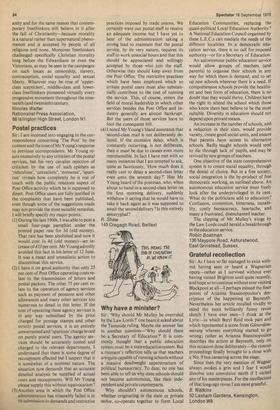Postal practices Sir : I am incensed into engaging in
the correspondence concerning 'The Post' by the content and the tone of Mr Young's response to previous correspondents. Mr Young reacts excessively to any criticism of the postal services, but his very cavalier rejection of criticism by the use of such epithets as 'ridiculous', `unrealistic', 'nonsense', 'spurious' reveals how completely he is out of touch with the public relations aspect of Post Office activity which he is supposed to direct. Post Office users are fully justified in the complaints that have been published, even though some of the suggestions made may not provide the most suitable remedies. I will briefly specify my major points: (1) During the late 1960s, I was able to post a small four-page pamphlet under the printed paper rate for 3d (old money). That rate has been abolished and now it would cost Is 4d (old money)—an increase of 433 per cent. Mr Young adroitly avoided this fact in his letter of 12 June. It was a mean and unrealistic action to discontinue this service.
(2) I have it on good authority that only 25 per cent of Post Office operating costs relate to the transmission of letters and postal packets. The other 75 per cent relate to the operation of agency services such as payment of pensions and other allowances and many other services too numerous to detail in this letter. If the cost of operating these agency services is in any way subsidised by the price charged for postage stamps and other strictly postal services, it is an entirely unwarranted and 'spurious' charge levied on purely postal users. The agency services should be accurately costed and charged to the relevant departments. I understand that there is some degree of recoupment effected but I suspect that it is somewhat of a nominal nature. The situation now demands that an accurate detailed analysis be supplied of actual costs and recoupments. Will Mr Young please supply this without equivocation?
(3) Another area in which the Post Office administration has miserably failed is in its submission to demands and restrictive practices imposed by trade unions. We certainly want our postal staff to receive an adequate income but I have yet to hear of the administration taking a strong lead to maintain that the postal service, by its very nature, requires its staff to work unsocial hours and that this should be appreciated and willingly accepted by those who join the staff. Otherwise they should keep away from the Post Office. The restrictive practices which have been employed which so irritate postal users must also substantially contribute to the cost of running the service. This, of course, enters the field of moral leadership in which other services besides the Post Office and industry generally are almost bankrupt. But the users of those services have to foot the consequent bill.
(4) I noted Mr Young's bland assurance that second-class mail is not deliberately delayed. If the excessive delay, which is constantly occurring, is not deliberate, then it must be due to causes even more reprehensible. In fact I have met with so many instances that I am tempted to ask, quite as facetiously, 'How much does it really cost to delay a second-class letter even unto the seventh day ?' Has Mr Young heard of the postman, who, when about to hand in a second-class letter on the first morning delivery, suddenly withdrew it saying that he would have to take it hack again as it was supposed to await the second delivery ?Is this entirely apocryphal ? ,
R. Shaw 145 Cregagh Road, Belfast





































 Previous page
Previous page